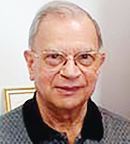
Adi Gazdar, MD
The International Association for the Study of Lung Cancer (IASCL) announced the death of Adi Gazdar, MD, of The University of Texas Southwestern Medical Center, Dallas, on December 29, 2018. Dr. Gazdar, a leader in lung cancer pathology, was a cell line pioneer and a groundbreaking pathologist. He is recognized for inspiring a generation of fellow researchers and improving outcomes for countless patients. Dr. Gazdar’s pioneering work with colleagues helped establish the largest collection of human cancer cell lines, which established the foundation for the field as it exists today.
Journey From India
Born in India, Dr. Gazdar received his medical degree from the University of London, Guys Hospital, and performed his residency in pathology at the Peter Bent Brigham Hospital in Boston. He worked at the National Cancer Institute, Navy Medical Oncology Branch, in Bethesda, where he served as a senior scientist and section head for more than 20 years. In 1991 Dr. Gazdar joined his long-time colleague and co-investigator John Minna, MD, at The University of Texas Southwestern Medical Center, where he served at the Simmons Cancer Center and Department of Pathology as the W. Ray Wallace Distinguished Chair in Molecular Oncology Research.
Unraveling Molecular Pathogenesis in Cancer
Dr. Gazdar is widely recognized for his work in elucidating the molecular pathogenesis of cancers, primarily lung cancer, both non–small cell and small cell lung cancers. His many discoveries and interests include studying the demographics of EGFR mutations, PIK3CA mutations and copy number changes in human cancers, lung cancer in never-smokers, and the neuroendocrine properties and heterogeneity of small cell lung cancer.
Furthermore, Dr. Gazdar is recognized for the establishment and characterization of more than 400 human tumor cell lines, including lung cancer of all types, but also breast, colon, and ovarian tumors as well as T-cell lymphomas. Dr. Gazdar mentored many lung cancer researchers and provided significant donations to the IASLC Foundation, which funds the research of young investigators. IASLC noted that Dr. Gazdar’s kindness, generosity, humility, and expertise will most certainly be missed, although his legacy will continue. ■
Editor’s Note: Dr. Gazdar discussed his work with cell lines, how the field of pathology has evolved over time, the integral nature of the patient advocacy community, and his experiences with IASLC, in a video interview filmed during a previous IASLC World Conference on Lung Cancer. To see the video, visit www.youtube.com/watch?v=iTfvlpIG9_s.

